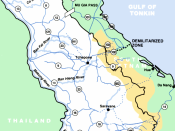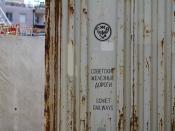As the Cold War progressed, the playing field for superpower altercations-by-proxy began to expand well past European boundaries, beginning with Korea in 1950. Vietnam was only one of the prominent (if not tragic) examples of the globalization of what should have been a small-scale confrontation. Instead, both the U.S.A and the U.S.S.R opted to fight out their differences by proxy. In Vietnam, this meant channelling personal hostilities through what should have been a strictly civil war, which could be argued would have not have taken place without superpower involvement in Geneva 1954. Nevertheless, like most tragedies and indeed most of history, the story of Vietnam is replete with "should haves"- it is all too easy to take benefit of hindsight for granted. Therefore, while the policies of the U.S.A and the U.S.S.R in Vietnam may seem reprehensible today, if should be remembered that a legacy of fifteen years of superpower rivalry by the time of the 1960s may prove the justification of their policies to some extent.
In most respects, Vietnam is often considered as "America's War." Beginning with Kennedy's "finger in the dike" approach to the Third World in 1960, to Johnson's disastrous "Rolling Thunder" and ground troop escalation, and ending with Nixon's "Vietmanization" and peace with honour, American foreign policy in the 1960s to 70s was unequivocally dedicated to Vietnam. In contrast, however, the U.S.S.R had none such interventionist policies. An overview of Soviet involvement will reveal that little more diplomatic pressure applied judiciously on Hanoi and the provision of weapons and other aid. Contrary to American paranoia at the time, Stately Kanow insisted: "Ho was never...a pawn of communist matters." Stalin's open criticism of Ho's questionable commitment to Marxism, due to the latter's attempts to engage the U.S.A and gain recognition from Tito in 1950, is ample...



Nice
interesting to read your views on the was these nations viewed nam.
2 out of 2 people found this comment useful.